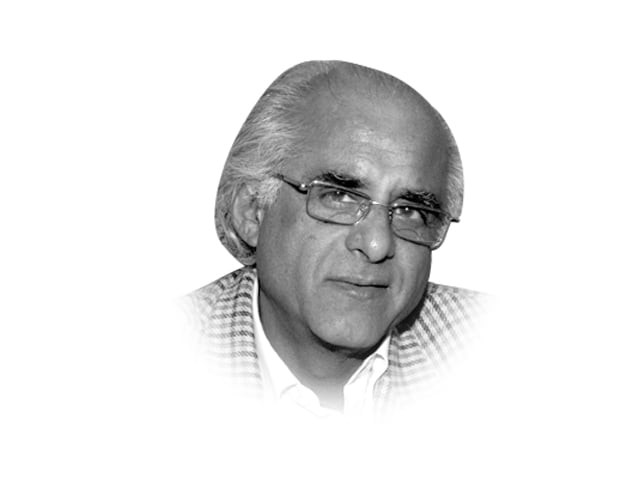Alexander’s monument
The funds for both Alexander monuments were supplied by the National Fund for Culture and Heritage.

Alexander’s monument
Outside the village, by the banks of the river, there sits a monument to Alexander’s greatness and achievements. Such a memorial would have been appropriate in Macedonia or Greece, but failing to see the reason of this celebration in Pakistan, I have judiciously avoided visiting it since it was built back in the mid-1990s. The monument owes itself entirely to the archaeologist Ahmad Hasan Dani.
Again, in the little village of Jalalpur, on the highroad between Serai Alamgir and Pind Dadan Khan, there is another monument, even more elaborate than the one at Hund. Here, we also have a so-called library and research centre. This, too, was ordered by Dani. The funds for both Alexander monuments were supplied by the National Fund for Culture and Heritage, of which Dani was a long-time head.
Now, before I go on, I must concede that Alexander is among my favourite historical personalities. I admire him unabashedly as much for his military genius as for his learning and largesse of the spirit. He was no mean-spirited brigand like many who came to our part of the world a thousand years after him. Regardless of how great a man he was, he did not belong to the land of the Sindhu River, he was not one of us. So far as I am concerned, these monuments are shameless genuflexion to a western god by Dani.
Was there no hero of the trans-Sindhu lands meriting a memorial that Dani bent his knee to Alexander? There was one, a giant of man, both in physical stature and soaring spirit. But because he belongs to our pre-Islamic past, we must never acknowledge him as our hero. The man was Raja Paurava, a Punjabi Rajput, king of the doab between the Jhelum and Chenab rivers. This is his story.
As Alexander came down the eastern escarpments of the Salt Range, he found the Punjabis arrayed on the far bank of the Jhelum. This was the first time the westerners were facing elephants in battle, and Alexander well knew the anxiety now surging through his troops. The trepidation was ever the greater because this being a bridgehead operation meant that as soon as they ran aground, the Greeks would be face-to-face with war elephants.
Alexander tried feints that did not work. And so, working by night, he surreptitiously moved his troops 30 kilometres upstream from their position near the modern village of Haranpur to Jalalpur. There, in the dark of night, over several nights he assembled his bridging equipment concealed behind a low hill running parallel to the river. The crossing Alexander planned for a moonless night around the middle of May.
On that night, shortly before midnight, there rose a terrific storm of wind and rain. This played entirely to Alexander’s advantage, for the clatter of his army launching the boats was drowned in the din of the storm. The westerners crossed and the battle was fought — a battle in which both sides emerged as victors. But of the encounter, another time.
Here we must know that exactly seven years earlier, on the banks of the Euphrates, Alexander stood similarly poised to cross. On the far side, there milled an army numbering nearly 200,000 under their king Daryavaush — Darius. His force being one-fourth that size, one of Alexander’s generals suggested a night attack. “I do not steal victories,” Alexander is reported to have snapped in irritation.
On the Euphrates, Alexander knew he faced a poltroon. A king so feckless that he had fled twice before upon seeing the Greek advance. Alexander crossed in broad daylight and Darius bolted yet again. On the Jhelum, Alexander’s intelligence had warned him of the nature of the man he was soon going to meet in combat. Conveniently forgetting his boast of never stealing victories, even though he faced an army somewhat smaller than his own, Alexander stole the passage across the Jhelum in the dark of a moonless, stormy night.
Published in The Express Tribune, December 31st, 2010.













COMMENTS
Comments are moderated and generally will be posted if they are on-topic and not abusive.
For more information, please see our Comments FAQ